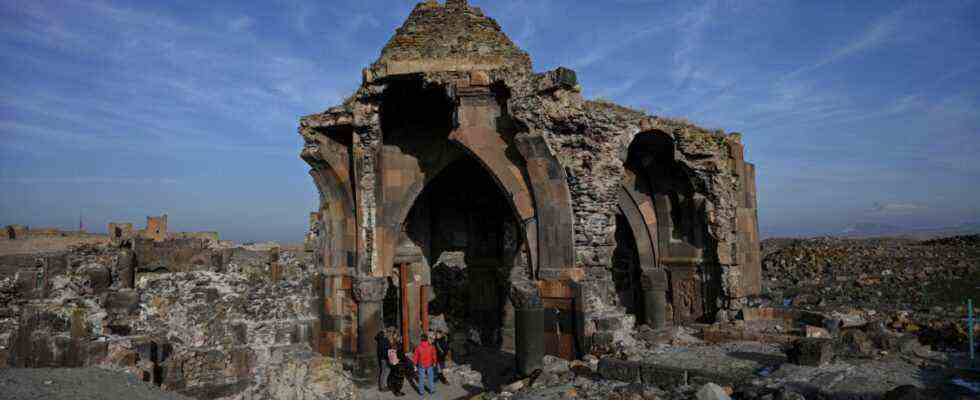The neighboring states of Turkey and Armenia, which have been enemies for decades, are reaching out to each other. The governments of the two countries, which have no diplomatic relations and whose relationship was severely strained by the Armenian genocide in World War I, now want to talk to each other again. The newly appointed special envoys of Turkey and Armenia will meet in Moscow on Friday to talk about normalizing relations.
The most important topic at the meeting moderated by the Kremlin is the opening of the Turkish-Armenian border, which has been closed since 1993. Also on the agenda is the creation of a land corridor from eastern Turkey through Armenia to Azerbaijan. That would be a step that could change the geopolitical positioning in the crisis-ridden South Caucasus and open up economic opportunities for all the states involved: for Armenia and Azerbaijan, but also for Turkey and Russia. Most importantly, the corridor would give Ankara access to Central Asia, fulfilling a Turkish dream.
The planned “Sangesur Corridor” would open the way from Turkey across the Caspian Sea and from there to Central Asia. This is not possible without this land connection: Azerbaijan, an ally of Ankara, does not share a border with Turkey, unlike its neighbor and nemesis Armenia. The Azerbaijani enclave of Nakhichevan alone, which lies far away from the heartland on Armenian soil, borders Turkey over a distance of 17 kilometers. Therefore, the corridor is needed to connect Turkey with the Azerbaijani heartland.
Since the collapse of the Soviet Union, the Turks have wanted to become the leading power in Central Asia, to open up both a market and a zone of political influence in historic “Turkestan”: via a connection from eastern Turkey via the Caucasus states of Armenia and Azerbaijan to the Caspian Sea. From there it would go on to Central Asia with the Turkic states of Turkmenistan, Uzbekistan, Kyrgyzstan and Kazakhstan. If this succeeds, Turkey could become a heavyweight in a large region controlled by Russia.
Russia is trying to protect its interests in the region
In Ankara, people have long dreamed of “a Turkish Silk Road,” says Emin Şirin Süddeutsche Zeitung. He was a member of parliament for President Recep Tayyip Erdoğan’s ruling AKP party and now works as a columnist and TV commentator. “Turkey can open up a path to Central Asia that doesn’t lead through Russia or Iran – from East Anatolia to Kazakhstan and the Chinese border.” After Ankara’s “successful, heavily militarily supported foreign policy in recent years has exhausted itself,” it is now time “to seek talks about foreign policy goals,” said Şirin. This is especially true for Central Asia. It’s not about big Turkish dreams, but about economic interests, says Şirin: “The market there has huge potential.”
Ankara’s strategic ambitions are unlikely to meet with approval in Moscow and Tehran. Both states, especially Russia as the successor to the USSR, have influence and interests in the Caucasus, which was formerly part of the Soviet Union, and in ex-Soviet Central Asia. The fact that Moscow is still moderating the upcoming talks between Turkey and Armenia has more to do with the fact that Russia is trying to protect its interests in the region in this way, says Stefan Meister from the German Council on Foreign Relations. After all, according to the expert on the region of the former Soviet Union, the Kremlin is the guarantor of the ceasefire agreement concluded between Armenia and Azerbaijan after the 2020 Caucasus war.
The agreement, which ended the war over the Nagorno-Karabakh region at the time, also provides for the creation of the Zangesur corridor. But under the supervision of Moscow. Russian security forces are supposed to guarantee free passage, not Turkish ones: Ankara would remain dependent on Moscow’s goodwill for its major strategic project.
Armenia is very interested in the corridor and a rapprochement with Turkey. After losing the Karabakh war in autumn 2020, the impoverished country is almost completely dependent on Russia. Moscow saved Yerevan from complete defeat in this war with a word of power. Economically, Armenia is isolated, it gets its supplies from Georgia and Iran. The country needs open borders with Turkey.
Much is at stake for Armenia, too
The Armenian Prime Minister Nikol Pashinyan sees this as an opportunity, according to Caucasus expert Meister. Even if the head of government seemed to be politically at the end after the lost Karabakh war, he was able to stay in power. With the corridor and the open border with Turkey, the political survivor could present the population with a success, explains Meister, adding: Yerevan urgently needs counterweights against the overpowering Russia, “Armenia’s sovereignty depends on opening the border with Turkey.”
But it’s not that far yet: Turks and Armenians share a tragic past. From an Armenian perspective, the murder of hundreds of thousands of Armenians living in the then Ottoman Empire by the Ottomans in 1915 was a genocide. For decades, Yerevan has unsuccessfully demanded that Ankara admit to genocide. Ankara denies this. It does not deny the “massacre” of the Armenians. However, it describes them as a result of the rebellion of Armenian insurgents. They would have made common cause with Russia as the war opponent of the Ottoman Empire, the massacres would have occurred in the “turmoil of war” without genocide intention.
So much work awaits the special envoys. Ankara is sending Serdar Kılıc, an experienced ex-ambassador, while Yerevan is sending deputy parliamentary speaker Ruben Rubinjan. As a gesture of goodwill before the Moscow meeting, Yerevan lifted its embargo on imports of Turkish goods, and Ankara announced the resumption of charter flights between the states. It remains to be seen whether such good will is enough: Turkey and Armenia had already approached each other in the early 2000s, and the opening of the border and thus reconciliation between the two countries seemed to be within reach. At that time they failed.

